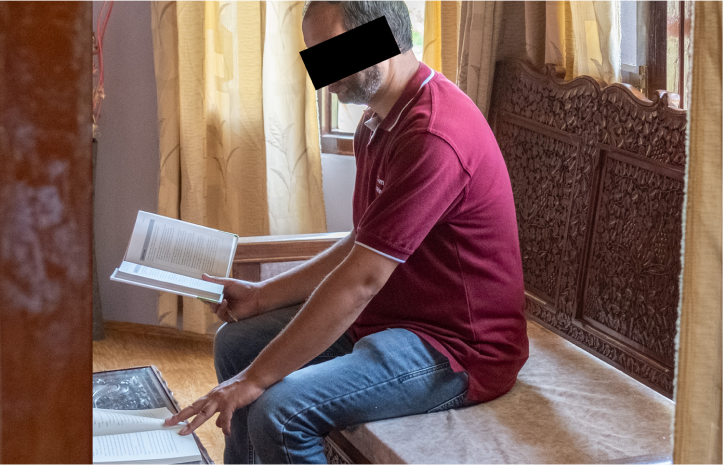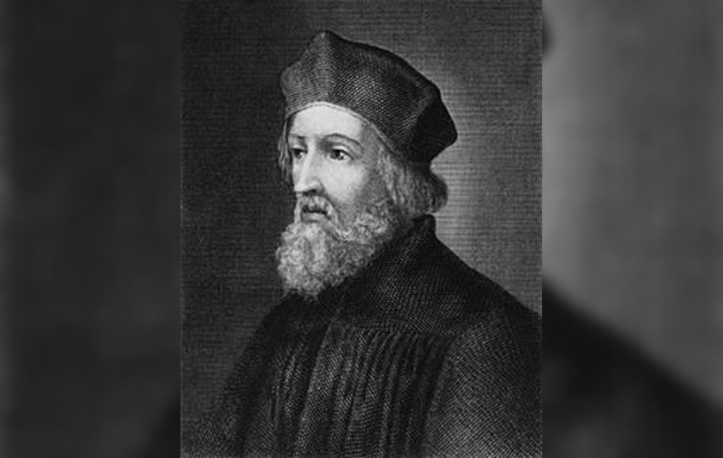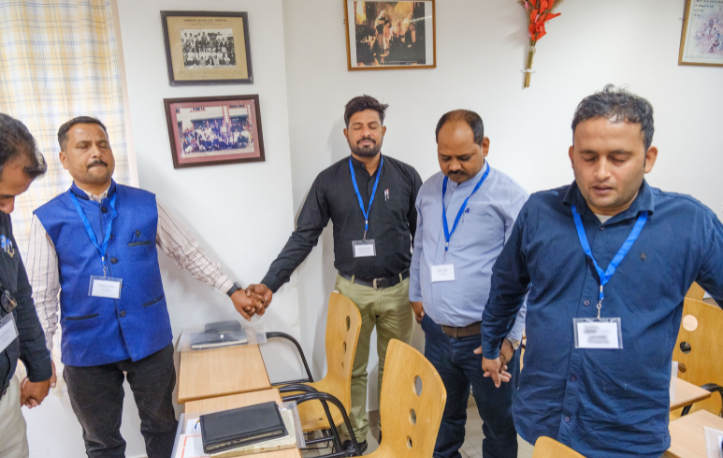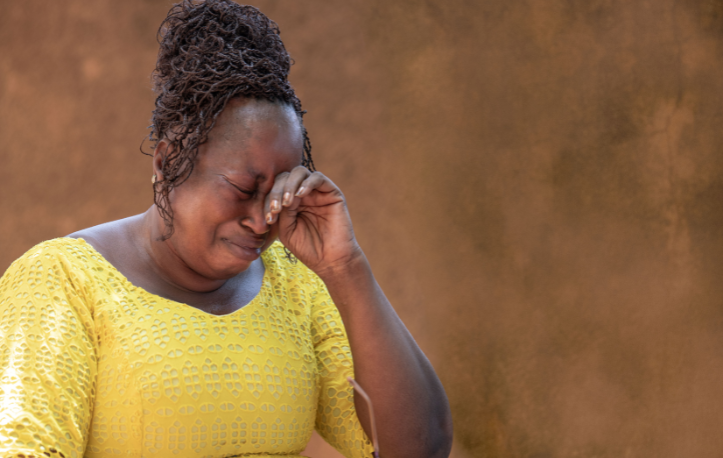As early as age eight, Ayyub had a desire to know Allah more deeply.
Although raised in Kashmir, a majority-Muslim region in northern India, his family belonged to a mystical sect of Islam known as Sufism. Ayyub’s parents taught him that all religions led to Allah, and he soon became interested in exploring other faiths.
“I wanted to know [Allah] because Sufism is focused on knowing Allah,” said Ayyub, now 40. Since Kashmir’s population is more than 97% Muslim, Ayyub initially examined other forms of Islam. He hopped from one Islamic sect to another, stitching together his own Islamic identity as a young adult.
Ayyub studied Arabic, the language of the Koran, to further his understanding of the book, and he quickly gained a following as a teacher and Islamic scholar. He estimates that he taught more than 400 students during this period. “There were people from all the districts [in Kashmir] wanting to know more,” he said. “I wanted people to know Islam better. I wanted to convert people to Islam.”
A Cherished Student
As Ayyub continued to study and teach what he had learned about Islam, he met a student named Farooq, whom he taught for a brief time. Farooq had grown up in a fundamentalist family that practised Sunni Islam, the majority branch of Islam in Kashmir. Like Ayyub, after years of study he became an Islamic scholar and teacher.
“Most of my time was in the mosques,” said Farooq, now 32. “Five times a day I would be praying. Then there would be sermons after that. My companions used to be those Islamic scholars who were the top scholars here.”
Ayyub and Farooq forged a strong friendship, but it was tested when their paths through Islam diverged. While Farooq remained devoted to mainline Sunni Islam, Ayyub turned towards Wahhabism (also known as Salafism), an 18th-century reform movement within Sunni Islam that has spawned most of the violent Islamist groups in existence today. Farooq respected his friend, but he viewed Ayyub’s shift towards Wahhabism as too extreme. As a result, he abruptly stopped seeking his guidance.
Over time, Ayyub began to doubt Wahhabism too. Then, while walking through town one day, he picked up a green book he saw on the side of the road. It was a New Testament. Although he had been taught that the Bible was corrupt, he took the book and started reading it.
“It was interesting because I never found Mohammed in the Bible … it was totally about Jesus,” Ayyub said. “In the Koran, it is said, ‘Another prophet will come, Jesus said, and his name will be Mohammed.’ But when I found the New Testament, it was totally not about Mohammed.”
After concluding in his late 20s that the Koran’s account was false, Ayyub rejected Islam and became an atheist. (VOM workers say it is not uncommon for Muslims to become atheists before hearing the gospel and placing their faith in Christ.) Still, Ayyub remained hungry for spiritual truth. For years, he watched videos of atheists debating people of faith, including Christians, but he eventually lost interest in atheism and found himself drawn back towards the idea of God. He wondered if God truly did exist.
“I prayed to God as an atheist,” he recalled, “‘God, if you really exist, please show me because I don’t have satisfaction inside’.”
Then, one night in 2012, Ayyub dreamed about the New Testament he had found. “God showed me in my dream that I should read this book again,” he said. “I started reading it again and it changed me. The Holy Spirit touched me. Then it was because of God; it was not because of logic. Then I started praying in the name of Jesus. Many things happened. God showed me spiritually Jesus is real.”
When Farooq learned that his friend Ayyub had left Islam altogether, he grew angry. In his eyes, turning to Christ was far worse — especially for a former Islamic scholar like Ayyub — than subscribing to Wahhabism. “When I learned that he had become a Christian, I would pit people against him,” Farooq said. “I used to tell people to rise up against Ayyub.”
Soon, Muslim men began challenging Ayyub’s beliefs in public and then beating him. The beatings continued for about a year. “It really hurt me sometimes,” Ayyub said, “but the Word of God always encouraged me.” Farooq, meanwhile, said he believed each beating pleased Allah.
For the next year and a half, Ayyub remained isolated as a new believer. He read his Bible, prayed and watched Christian videos online to help him grow in faith. Then he met a Christian pastor who provided biblical teaching, brought him into the fold of the local Christian community and eventually baptised him in 2013.
After his baptism, Ayyub made a firm decision. “I freely decided to commit to God that I would do full-time ministry,” he said.
A New Bond
In 2014, Ayyub fell in love and married. His wife became a Christian in 2017.
At about that same time, Ayyub’s friend Farooq started having doubts about Islam. He realised that the Muslims he was around weren’t having a positive influence on him.
“My main reason to be with these people was that I wanted to be a good human being,” he said. “But the opposite of that happened. I realised that what I learned was telling lies and bearing grudges against people … speaking ill about others.”
Farooq had also grown tired of the hatred and violence he found in the Koran. Finally, he rejected Islam and became an atheist, just as Ayyub had done before coming to know Christ.
“When I turned towards atheism,” Farooq said, “it was a difficult decision for me because I was indoctrinated in Islamic teachings. I was in kind of a dilemma.”
One day in 2020, Farooq ran into Ayyub in the street. When he told Ayyub that he had become depressed since leaving Islam, Ayyub urged him to follow a new path instead of the destructive one he was currently following. Just as travelling from Kashmir to Jammu requires a certain route, he explained, so does coming to faith in God.
“You won’t find Him in the Koran,” Ayyub told Farooq. “You will find Him in the Bible.” He then gave Farooq a Bible, which he took home and read with great interest.
“I read the entire Bible,” Farooq said, “and the God I was seeking — the God Who loves me — I found in the Gospels. When I read John 3:16, that ‘God so loved the world that He gave His only begotten Son,’ that was the turning point.”
The gospel helped Farooq love his old friend again. Through their renewed friendship, Farooq ceased being Ayyub’s persecutor and resumed being, once again, his student. “There was a loving bond between the two of us,” Farooq said. “I began to respect him as my teacher.”
On Mission
Today, Ayyub still teaches Farooq four times a week.
“You can see the difference [in Farooq],” Ayyub said. “Before he was very angry … It is the Holy Spirit, Jesus. [Farooq] is now teaching many people, and many of them are close to salvation.”
Farooq sees a difference in Ayyub too. He said when Ayyub mentored him as a Muslim, he focused on the rules of Islam, what to do and when to pray. Now he focuses on love, compassion and his relationship with Christ.
Farooq said he is thankful for his friend’s faithfulness and for God’s love. “I am filled with joy that I am doing work like this and God is changing me,” he said. “I am seeing God’s glory.”
Ayyub helps provide audio Bibles for pastors in Kashmir and has recorded himself reading the New Testament, Psalms and Proverbs for a radio ministry. He and Farooq often place Bibles in public places so Muslims can discover them — just as Ayyub discovered his New Testament years ago.
“Now we go to all the districts … and we distribute literature,” Ayyub said. “We make connections and make friendships. Many people come to Christ.”
Ayyub greatly values his friend Farooq as a ministry partner. “He is always helping me,” he said, “always ready to go to any place and always ready for Christ. He is very bold.”
Ayyub asked us to pray for his gospel outreach to Muslims, adding that he is witnessing a growing interest in the Bible among Kashmiris. He encourages them to read it for themselves with an open mind. “Many people who are totally against the Bible and are not Christians are reading the Bible nowadays,” he said.
Still, many Christians in Kashmir live in fear, and Ayyub said pastors are often afraid to share the gospel. Ironically, the one thing that freed him from fear was persecution. “Without persecution, you might have a lot of fear,” he said, “but after persecution, you don’t have fear. It is because I saw Christ in the persecution. He gave me a way out.”
Ayyub’s parents, who hold to their mystical Sufi beliefs, have accepted his conversion to Christianity, and his brother recently placed his faith in Christ. Despite these developments, Ayyub said he expects to experience more persecution because the gospel is still a threat to the dominance of Islam in Kashmir.
Farooq’s fundamentalist Sunni family is still unaware of his Christian faith, but he is prepared for them to learn the truth soon. “They could either kick me out of the house or disown me,” he said. “They could even beat me up. The people I used to associate with … might even kill me. There is a danger, but there is no fear. The maximum that I can expect is martyrdom.”




Submit a Prayer